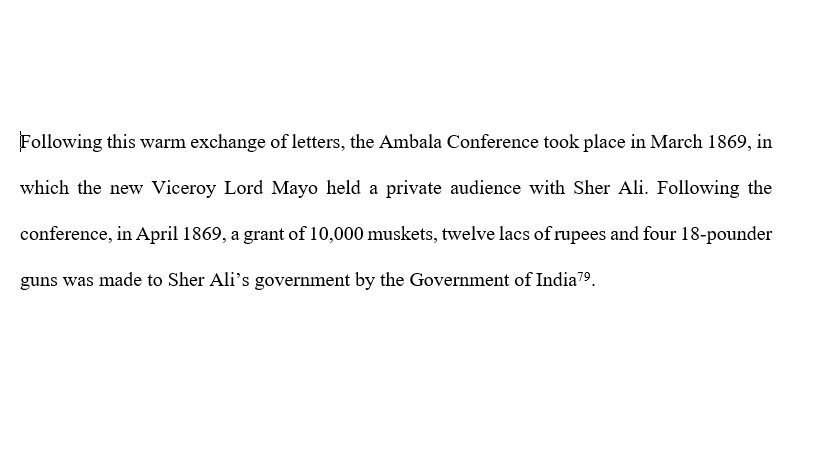I've been asked by a few on my opinions on this thread, which I'll address in this thread of my own.
When partisans cling to the state-sponsored histories of their respective states, distortion becomes inevitable, even if executed inadvertently. https://twitter.com/tequieremos/status/1345857774014636035
When partisans cling to the state-sponsored histories of their respective states, distortion becomes inevitable, even if executed inadvertently. https://twitter.com/tequieremos/status/1345857774014636035
1) Lands 'sold' in 1879.
Actually, Kabul received subsidies from British India way before 1879, starting in 1857.
The simple reason: Britain used these subsidies to purchase favour with Kabul. The 1879 subsidy was a continuation of the status quo ante bellum, not an exception.
Actually, Kabul received subsidies from British India way before 1879, starting in 1857.
The simple reason: Britain used these subsidies to purchase favour with Kabul. The 1879 subsidy was a continuation of the status quo ante bellum, not an exception.
2) Treaty of Gandamak.
Per Article 9, Khyber/Michni were held by the British indefinitely. Kurram/Pshin/Sibi not 'permanently severed from limits of the Afghan Kingdom'.
The Treaty was signed by Yaqub to ensure British withdrawal; not sell land the British had already seized.
Per Article 9, Khyber/Michni were held by the British indefinitely. Kurram/Pshin/Sibi not 'permanently severed from limits of the Afghan Kingdom'.
The Treaty was signed by Yaqub to ensure British withdrawal; not sell land the British had already seized.
3) Amir Abdul Rahman was not pressured to sign the Durand deal and so willingly.
Abdul-Rahman was pressured by the British for years to sign the treaty, which he had resisted. They eventually resorted to blocking iron imports to him, retarding his brutal war in Hazarajat.
Abdul-Rahman was pressured by the British for years to sign the treaty, which he had resisted. They eventually resorted to blocking iron imports to him, retarding his brutal war in Hazarajat.
4) The claim that there was 'popular approval' for the Durand deal.
Amir Abdul Rahman instituted the most autocratic, authoritarian government Afghanistan had and has ever known, thus known as the 'Iron Amir'. There was no mechanism of popular representation/approval. At all.
Amir Abdul Rahman instituted the most autocratic, authoritarian government Afghanistan had and has ever known, thus known as the 'Iron Amir'. There was no mechanism of popular representation/approval. At all.
(Continued)
Abdul-Rahman's proclamations of happiness and contentment with the Durand Agreement can be interpreted as political posturing.
Think of all 'deals' even in today's democracies, do leaders ever emerge from negotiations proclaiming they had signed a bad deal?
Abdul-Rahman's proclamations of happiness and contentment with the Durand Agreement can be interpreted as political posturing.
Think of all 'deals' even in today's democracies, do leaders ever emerge from negotiations proclaiming they had signed a bad deal?
In conclusion:
1) British payments to Kabul were the norm prior to territorial cessions, in order to buy Kabul and bring it on side
2) The loss of Pshin/Sibi/Kurram were temporary in 1879
3) Abdul Rahman WAS pressured, majorly
4) There was no popular approval of the Durand deal
1) British payments to Kabul were the norm prior to territorial cessions, in order to buy Kabul and bring it on side
2) The loss of Pshin/Sibi/Kurram were temporary in 1879
3) Abdul Rahman WAS pressured, majorly
4) There was no popular approval of the Durand deal
The points regarding Amanullah's confirmation of the Line are clear and valid. Also covered by @paykhar and I on our podcast on Amanullah Khan's reign.
Valid critiques to be made of Daud/Zahir Pashtunistan policy, which relied way too heavily on charlatans like Bacha Khan & co.
Valid critiques to be made of Daud/Zahir Pashtunistan policy, which relied way too heavily on charlatans like Bacha Khan & co.
The talk of 'legality' of borders is hot air. Our region did not and does not operate according to 'international law'. India does not hold Kashmir because of legality, it occupies it because it can. Pakistan does not hold KPK/FATA due to legality, but because it can.
Presenting Westminster's statements in order to confer legality on the Durand is self-defeating because:
a) Britain won't declare an arrangement it itself was the architect of to be illegal.
2) The same British also left Pakistan with its now 7 decade long struggle in Kashmir.
a) Britain won't declare an arrangement it itself was the architect of to be illegal.
2) The same British also left Pakistan with its now 7 decade long struggle in Kashmir.
Sources:
The first three excerpts: my MA dissertation
The latter excerpts: Muhammad Hassan Kakar, A Political and Diplomatic History of Afghanistan
The first three excerpts: my MA dissertation
The latter excerpts: Muhammad Hassan Kakar, A Political and Diplomatic History of Afghanistan

 Read on Twitter
Read on Twitter








